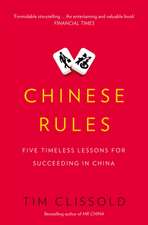The Global Enterprise: Entrepreneurship and Value Creation
Autor Erdener Kaynak, Riad Ajami, Marca Marie Bearen Limba Engleză Paperback – 22 noi 2006
Entrepreneurial ideas that look great on the drawing board can turn out to be deal breakers when introduced in real markets, even when they’ve been put through the toughest business modeling tests. The Global Enterprise examines how a healthy relationship between entrepreneurship and globalization can combine with new methods of knowledge creation to enhance economic development and build firm sustainability. This unique book takes a fresh and innovative approach to the practical aspects of international business, including economic cluster formation, network formation, market entry, public policy controls and incentives, economic competitiveness, and the creation of value.
The Global Enterprise offers perspectives from practitioners and academics working in a variety of disciplines in Europe, Asia, the Middle East, and the United States. Their contributions address many of the vital issues of global business, including value-added chains, cross-border networks, knowledge management, technology transfer, transnational lines of production, distribution, marketing, and financial flows, and the strategic partnerships between government and corporations. The book is illustrated with more than 65 tables and figures, and articles are organized into three sections—“Globalization: Building Firm Sustainability,” “Entrepreneurship and Public Policy: Economic Competitiveness,” and “Knowledge Creation: Knowledge Management, Knowledge Transfer, and Cluster Formation.”
The Global Enterprise examines:
- the global transfer of capital
- strategic partnerships between governments and multinational firms
- the prospects for economic progress in developing countries
- the impact of small- and medium-sized enterprises (SME)
- the role of export regulations in national security and in safeguarding foreign policy
- the evolution of the Hard Rock Café
- cultural ontology
- global virtual teams (GVT)
- how to implement a knowledge management project
- a framework for discussing entrepreneurship from an environmental perspective
- and much more
Preț: 277.89 lei
Preț vechi: 368.87 lei
-25% Nou
Puncte Express: 417
Preț estimativ în valută:
53.19€ • 57.80$ • 44.71£
53.19€ • 57.80$ • 44.71£
Carte tipărită la comandă
Livrare economică 22 aprilie-06 mai
Preluare comenzi: 021 569.72.76
Specificații
ISBN-13: 9780789023407
ISBN-10: 0789023407
Pagini: 390
Dimensiuni: 148 x 210 x 25 mm
Greutate: 0.72 kg
Ediția:1
Editura: Taylor & Francis
Colecția Routledge
Locul publicării:Oxford, United Kingdom
ISBN-10: 0789023407
Pagini: 390
Dimensiuni: 148 x 210 x 25 mm
Greutate: 0.72 kg
Ediția:1
Editura: Taylor & Francis
Colecția Routledge
Locul publicării:Oxford, United Kingdom
Cuprins
- About the Editors
- Contributors
- Foreword (Gail Arch)
- Acknowledgments
- Introduction (Riad A. Ajami and Marca Marie Bear)
- I. GLOBALIZATION: BUILDING FIRM SUSTAINABILITY
- Chapter 1. Science and Technology: Policies for Competitiveness in the Twenty-First Century (Edward J. Malecki)
- Introduction
- The Necessity for Science and Technology
- Global Competitiveness
- Learning: Various Forms, All Necessary
- Flexibility and the New Rules of Competition
- Technology Transfer: Not an Easy Route to Competitiveness
- The Challenge of Technology Upgrading
- Conclusions and Suggestions for Policy
- Chapter 2. The Impact of the Institutional Environment on Eastern European Economies: Corporate Strategy of Small and Medium-Sized Enterprises (Stephan Bourcieu)
- Introduction
- Acting on the Institutional Environment
- Presentation of Results
- Conclusion
- Chapter 3. International Location of Research and Development: Which Dimensions Lead to the Decision? (Patrice Houdayer and Frédéric Fontante)
- Introduction
- Identification of Variables for International Location of R&D
- Research Methodology and Description of Sample
- Analysis of Results and Discussion
- Conclusion
- II. ENTREPRENEURSHIP AND PUBLIC POLICY: ECONOMIC COMPETITIVENESS
- Chapter 4. Entrepreneurship Policy, Economic Development, and Competitiveness: A Study of Culture, Public Policy, and Enterprise in the Asia-Pacific Region (Leo Paul Dana)
- Introduction
- Culture
- Public Policy
- Hong Kong
- Japan
- Macao
- North Korea
- Singapore
- South Korea
- Vietnam
- Conclusion
- Chapter 5. The Entrepreneur’s Influence on Firms’ International Behavior (Svante Andersson)
- Literature Review
- Methodology
- Case Analysis
- Discussion
- Implications and Further Research
- Chapter 6. Entrepreneurship in the Experience Economy: The Evolution of the Hard Rock Café (Stephen V. Horner, Todd H. Chiles, and Long W. “Rico” Lam)
- Introduction
- History of the Hard Rock Café
- The Founders of the Hard Rock Café
- The Leaders of Hard Rock Café International
- Hard Rock Café International Current Operations
- Industry and Competitive Environment
- Managing a Cultural Brand
- Current Issues Facing Management
- Chapter 7. The Impact of Technological Activities of Multinational Enterprise Subsidiaries on Host Countries: The Case of Non-U.S. Subsidiaries of Computer and Electronics Multinational Enterprises Operating in the United States (Kamel Abdallah, Riad A. Ajami, and Marca Marie Bear)
- Introduction
- MNE Technology Transfer and Host Country Economic Competitiveness
- Research Objective
- Macrocomparative Government Technology Policies
- Analysis of Studies
- Impact of Foreign Subsidiaries of Multinational Enterprises on U.S. Technology Policy
- Research Propositions and Data Collection
- Results
- Conclusion and Contributions
- Chapter 8. Corporate Performance in Jordan: A Macroanalysis (Muhsen Makhamreh)
- Introduction
- Measures of Corporate Performance
- Methodology
- Findings of the Study
- Conclusions and Recommendations
- III. KNOWLEDGE CREATION: KNOWLEDGE MANAGEMENT, KNOWLEDGE TRANSFER, AND CLUSTER FORMATION
- Chapter 9. Cultural Ontology Specifications for Interorganizational Knowledge Processes (El-Sayed Abou-Zeid)
- Introduction
- Interorganizational Knowledge Processes and Their Cultural Dimensions
- Toward Cult
Notă biografică
Marca Marie Bear, Erdener Kaynak, Riad Ajami
Descriere
Entrepreneurial ideas that look great on the drawing board can turn out to be deal breakers when introduced in real markets, even when they've been put through the toughest business modeling tests. The Global Enterprise examines how a healthy relationship between entrepreneurship and globalization can combine with new methods of knowledge creation to enhance economic development and build firm sustainability. This unique book takes a fresh and innovative approach to the practical aspects of international business, including economic cluster formation, network formation, market entry, public policy controls and incentives, economic competitiveness, and the creation of value.









